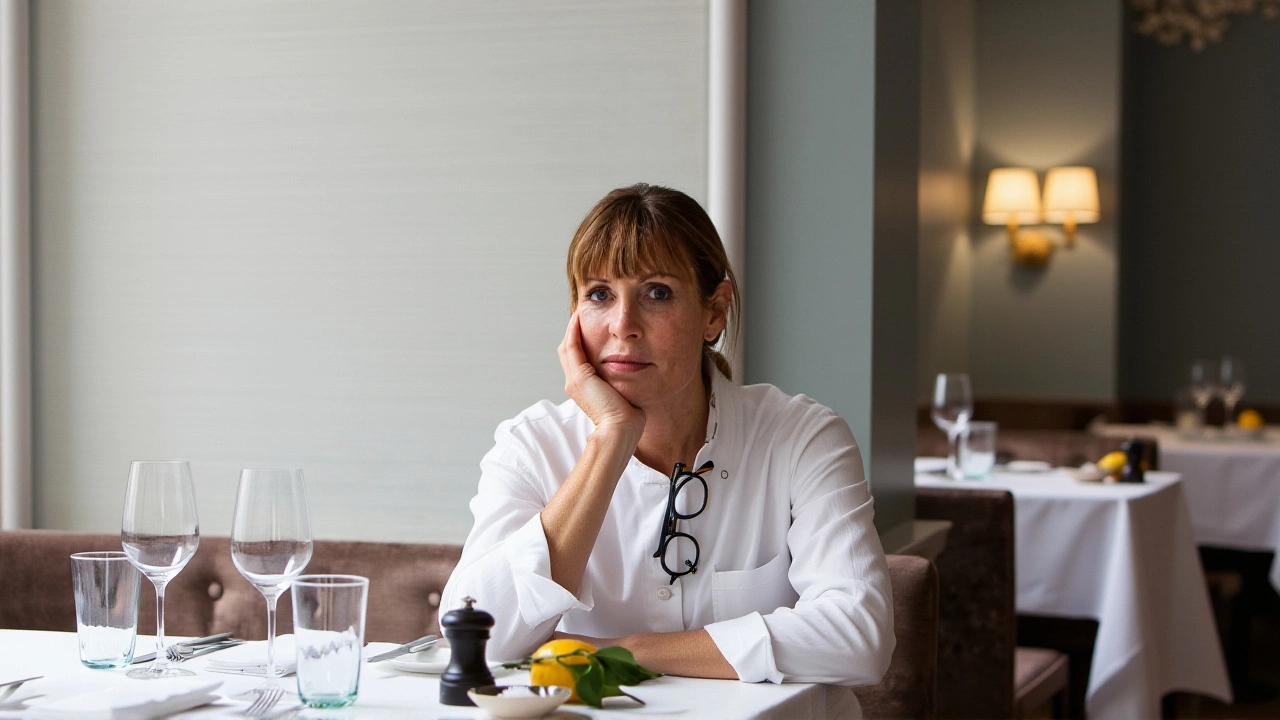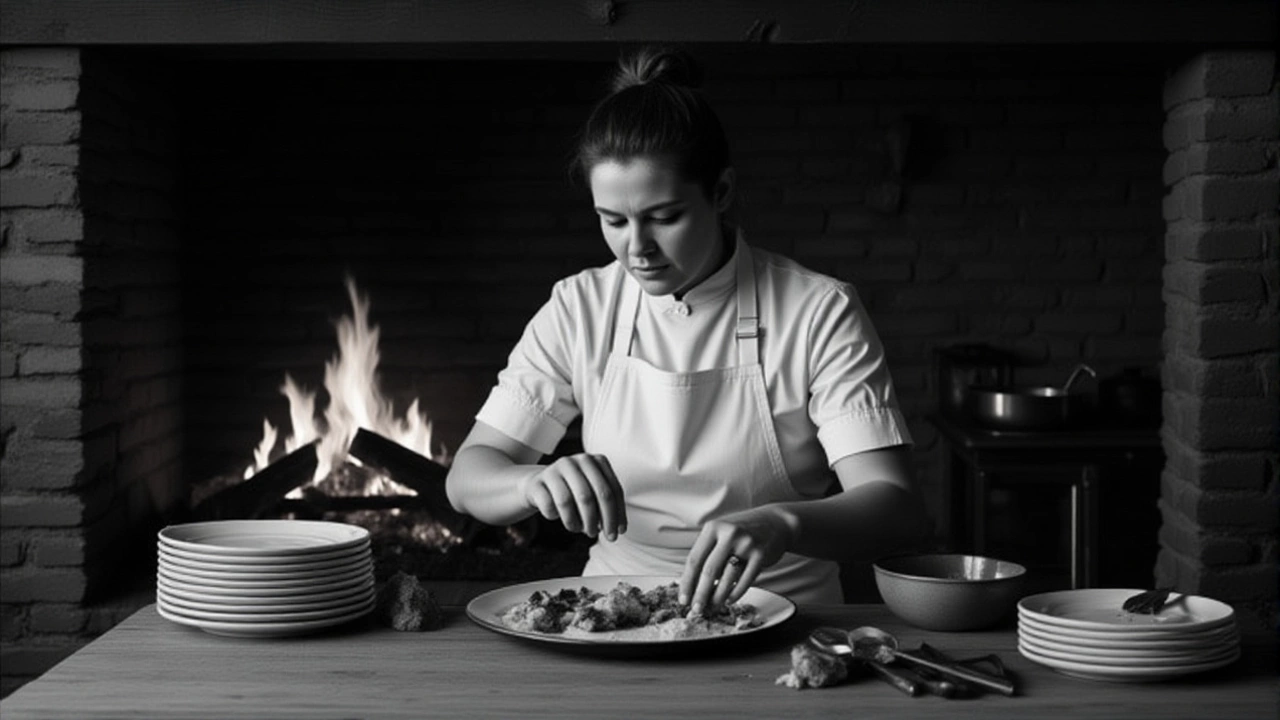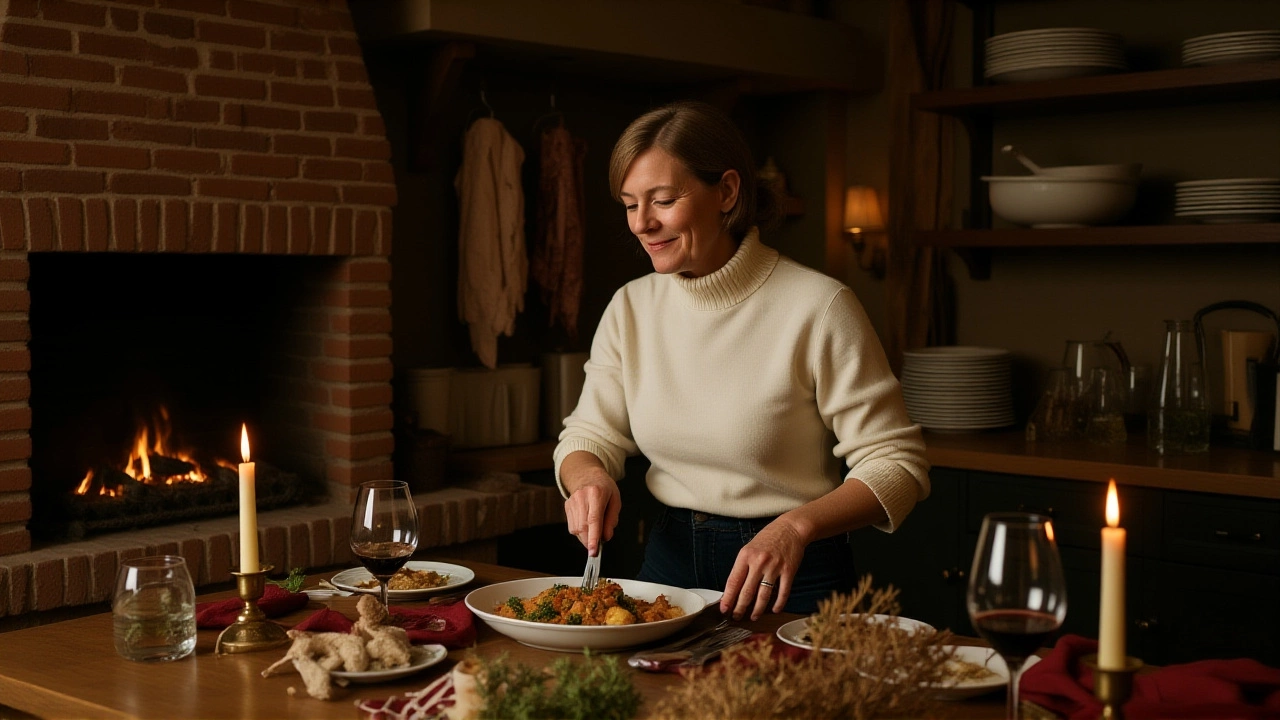When Skype Gyngell lights the oven on New Year’s Eve, she’s not just cooking dinner—she’s honoring a quiet revolution in British food. Her curated winter feast, featured in Homes & Gardens, includes plump oysters, spiced eggnog infused with nutmeg and cardamom, slow-roasted lamb from heritage breeds, and tender slow-cooked chard glazed in olive oil and lemon. It’s not flashy. It’s not imported. It’s exactly what the UK’s cold, damp earth has to offer in December—and that’s the point.
A Philosophy Forged in Seasonal Truth
Gyngell didn’t invent seasonal cooking in the UK, but she made it unavoidable. Back in the early 2000s, when menus still boasted strawberries in January and pineapples at Christmas, she stood in the kitchen of Petersham Nurseries Café and refused to budge. "People didn’t talk about cooking seasonally," she told Great British Chefs. "If you looked at a Gordon Ramsay menu, it would have things like pineapples, strawberries and asparagus on during December. Supermarkets and globalisation meant people just didn’t know when an ingredient was in season." Her refusal wasn’t ideological—it was practical. She worked with Fern Verrow, a biodynamic farm in Hertfordshire, to build relationships with growers who harvested only what the soil could sustain. That partnership, now nearly a decade old, became the backbone of her zero-waste ethos: carrot tops became pesto, lamb bones turned into broth, and even beetroot greens found their way into salads. When she won a Michelin star in 2011, she called it a "curse." Why? Because the pressure to serve more, faster, clashed with the rhythm of the land.The Long Road to Spring
After nearly ten years at Petersham, Gyngell walked away—not to retire, but to rethink. She spent five years teaching at culinary schools and editing food magazines, rediscovering why she fell in love with cooking in the first place: connection. Then came the search for a new space. Two years. Dozens of rejected applications. Months of planning permission battles. Finally, she found it: the old inland tax revenue offices at Somerset House, a Georgian landmark in central London. With backing from the Chan family, she transformed the space into Spring, opening in 2019. No velvet curtains. No overpriced truffles. Just wood-fired ovens, open kitchens, and menus that change daily based on what arrived that morning from Fern Verrow. Her monthly recipe for New Season’s Potatoes with Lovage Oil isn’t just a dish—it’s a manifesto. "Works as an accompaniment to almost anything," she writes on Spring’s website. "Try it with grilled lamb, roast chicken, or the first of the season’s wild salmon."
The New Year’s Table: Tradition Meets Quiet Innovation
Her New Year’s menu isn’t about extravagance. It’s about intention. The winter spiced eggnog uses raw egg yolks from free-range hens, cinnamon from a single-origin supplier, and a splash of apple brandy made in Kent. The roasted lamb comes from a flock raised on chalk downland, aged for 21 days, and basted in rendered lamb fat and rosemary. Even the slow-cooked chard is layered with garlic, lemon zest, and a touch of honey—not to sweeten, but to balance the earthiness. She doesn’t serve foie gras. She doesn’t use truffle oil. Her version of Caesar salad uses farm-grown lettuce, anchovies cured in-house, and a dressing made from fermented garlic. "It’s not about being different," she told The Independent in a truncated but telling quote. "So for a while I gave up on it altogether—until I realised the best way to usher in the new year was by cooking a celebratory meal and keeping..." The sentence ends, but the meaning lingers: keeping presence. Keeping connection. Keeping the food real.Why This Matters Beyond the Plate
In a time when holiday meals are increasingly dictated by Instagram trends and delivery apps, Gyngell’s approach feels radical. Her recipes are accessible enough for home cooks but rooted in deep agricultural knowledge. She’s not selling a lifestyle—she’s offering a reset. A way to slow down. To cook with your hands, to taste the difference between a carrot pulled in November and one shipped from Spain in December. Her influence is visible everywhere now. Even supermarkets have seasonal produce sections. Restaurants list farm names on their menus. But Gyngell remains quiet about her legacy. "I just wanted to make food that tasted like it came from somewhere," she once said. "Not from a container."
What’s Next for Gyngell?
Spring’s 2025 calendar already includes a collaboration with local beekeepers for a honey-based dessert series and a winter foraging workshop with wild mushroom experts. She’s also developing a small cookbook focused entirely on root vegetables—no flash, no fuss, just the quiet beauty of turnips, parsnips, and celeriac, transformed through time and heat.Frequently Asked Questions
How does Skye Gyngell’s approach differ from other celebrity chefs?
Unlike many celebrity chefs who prioritize spectacle or imported luxury ingredients, Gyngell builds menus around what’s locally and seasonally available—often from just one farm, Fern Verrow. Her dishes avoid truffles, foie gras, and out-of-season fruits, focusing instead on humble roots, leafy greens, and ethically raised meats. This grounded, transparent approach contrasts sharply with the high-gloss, globalized menus common in fine dining.
Why did she call her Michelin star a "curse"?
The Michelin star brought overwhelming demand to Petersham Nurseries Café, a small, intimate space with only 28 seats and a team of six. The pressure to scale up clashed with her slow, hands-on philosophy. She felt forced to compromise on sourcing and prep time, which undermined her core values. The star, while prestigious, threatened the very rhythm of cooking she cherished.
What role does Fern Verrow play in her cooking?
Fern Verrow, a biodynamic farm in Hertfordshire, supplies nearly all of Spring’s produce. Gyngell works directly with the farmers, adjusting menus based on what’s harvested each week. This partnership enables zero-waste cooking—every part of the plant is used, from beet greens to radish tops. The farm’s soil health directly influences flavor, making Gyngell’s dishes taste uniquely tied to place and season.
Can home cooks replicate her New Year’s recipes?
Absolutely. Her recipes are designed for home kitchens, with no specialized equipment. The winter eggnog uses simple spices and raw eggs from trusted sources; the lamb requires only salt, pepper, and slow roasting. The key is sourcing seasonal ingredients—visit a farmers’ market, ask where your food comes from, and cook with what’s abundant. Her philosophy is simple: taste the season, not the supply chain.
What’s the significance of Somerset House as Spring’s location?
Somerset House is a historic 18th-century building once used for tax collection, symbolizing control and bureaucracy. Gyngell’s choice to open a restaurant there—after years of bureaucratic hurdles—was deliberate. It’s a quiet rebellion: turning a place of institutional power into one of nourishment, community, and seasonal truth. The space’s architecture—high ceilings, natural light, open arches—mirrors her cooking: clear, uncluttered, and grounded.
How has Gyngell influenced the UK food scene since the 2010s?
She helped shift British dining from imported luxury to local authenticity. Before her, seasonal menus were rare. Now, even chain restaurants list farm names. Her work with Fern Verrow set a standard for traceability. Chefs like Angela Hartnett and Yotam Ottolenghi have cited her influence. She proved that sustainability isn’t a trend—it’s the only way to cook with integrity.






